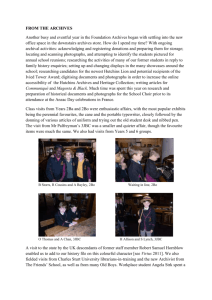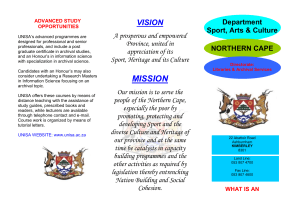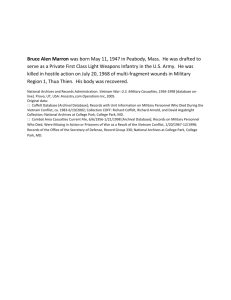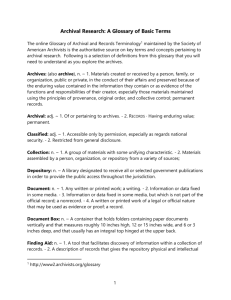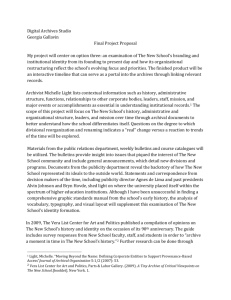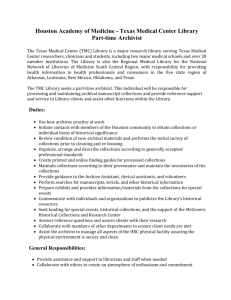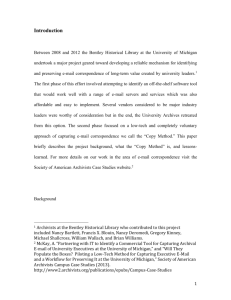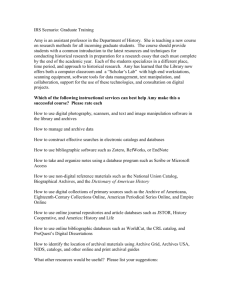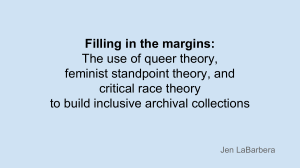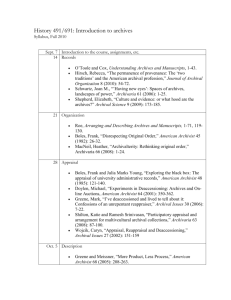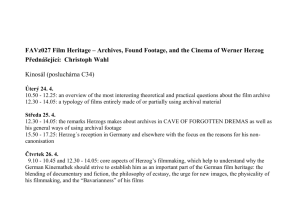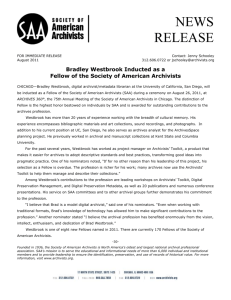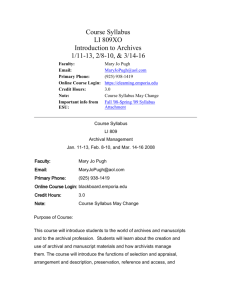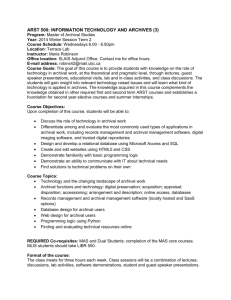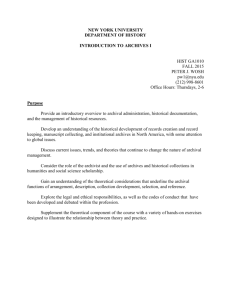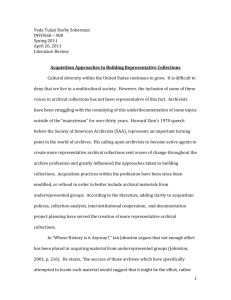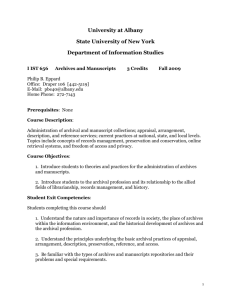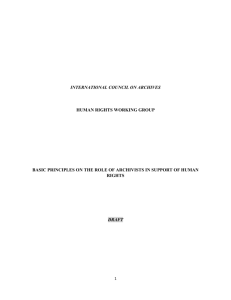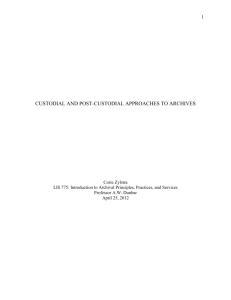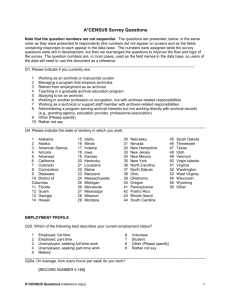Administration & Use of Historical Archives
advertisement
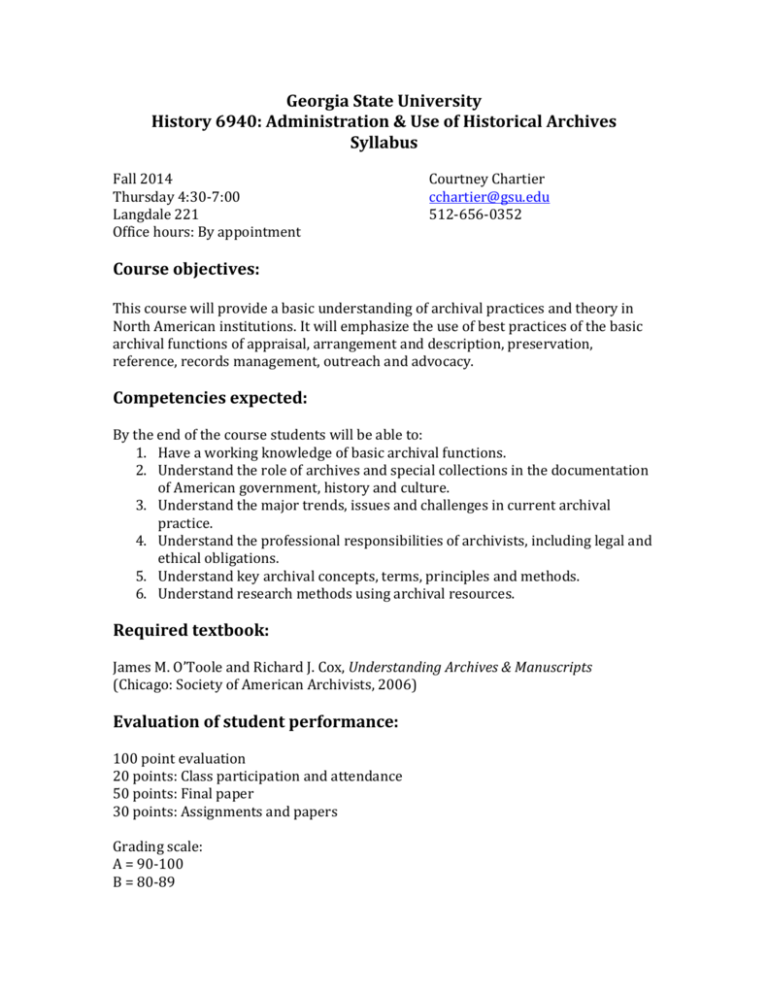
Georgia State University History 6940: Administration & Use of Historical Archives Syllabus Fall 2014 Thursday 4:30-7:00 Langdale 221 Office hours: By appointment Courtney Chartier cchartier@gsu.edu 512-656-0352 Course objectives: This course will provide a basic understanding of archival practices and theory in North American institutions. It will emphasize the use of best practices of the basic archival functions of appraisal, arrangement and description, preservation, reference, records management, outreach and advocacy. Competencies expected: By the end of the course students will be able to: 1. Have a working knowledge of basic archival functions. 2. Understand the role of archives and special collections in the documentation of American government, history and culture. 3. Understand the major trends, issues and challenges in current archival practice. 4. Understand the professional responsibilities of archivists, including legal and ethical obligations. 5. Understand key archival concepts, terms, principles and methods. 6. Understand research methods using archival resources. Required textbook: James M. O’Toole and Richard J. Cox, Understanding Archives & Manuscripts (Chicago: Society of American Archivists, 2006) Evaluation of student performance: 100 point evaluation 20 points: Class participation and attendance 50 points: Final paper 30 points: Assignments and papers Grading scale: A = 90-100 B = 80-89 C = 70-79 D = 60-69 F = 59 and below Class participation (20 points): This course meets once per week and regular attendance is required. Two excused absences are allowed during the semester. Notify the instructor prior to class if you will not be able to attend. Points will be taken off for 3 or more absences and excessive absences may result in removal from the course. Substantive participation in class discussions and presentations is required and points will be deducted if you do not participate in class discussions. Assignments and papers (30 points): Assignments and papers are due at the end of the class period. One point will be deducted for each assignment or paper turned in late. Reading response papers (2), 2-3 pages (5 points each, one due October 16, one due November 6): Write two response papers about the readings. No more than one paper per class topic. What are your reflections on the readings? How did the reading relate to each other (if applicable)? What kinds of questions did the readings raise for you? What did you learn? Website response paper, 4-5 pages (10 points, due October 30): Choose the websites of two (2) archival repositories and write a comparative critique. What information is included on the site? What information was missing? What kinds of policies were available to researchers and how did they compare? Was it easy to navigate? What types of technologies were included (i.e., searchable finding aids, social media apps, digital exhibits or collections, etc.)? Researcher experience paper, 4-5 pages (10 points, due November 20): Visit an institution of your choice as a researcher. Please do not tell the staff that you are a student on an assignment for a course in archives. Request archival material from a collection of your choice and write about your experience. What was the procedure? What was your interaction with the staff and the repository? What guidance was offered? What online and/or repository only resources were available? For some ideas on local repositories, please see the Society of Georgia Archivists website for ideas: http://soga.org/repositories. Final paper (50 points): Write a 10-12 page research paper. Please send your topic for approval via email by November 11. Papers will be evaluated on clarity of thesis, critical analysis of the thesis, supporting research and grammar. You may chose between, 1. A critical analysis of any topic in archival literature. 2. A research paper on any subject utilizing archival resources. Academic dishonesty: All instances of academic dishonesty, including cheating and plagiarism, will result in a grade of zero for the particular assignment. Class schedule: August 28: No class September 4: Introduction to Archives Reading assignments: O’Toole & Cox, Introduction and Chapter 1 David Gracy, “Archives and Society: The First Revolution,” American Archivist 47:1, (Winter 1984): 6-10 [available through library’s e-journals, www.archivists.org or Hathi Trust]. September 11: Archives in society Reading assignments: O’Toole & Cox, Chapter 2 September 18: Archival principles & practice Reading assignments: O’Toole & Cox, Chapters 3 & 4 Review the “Role Delineation” section of the Academy of Certified Archivists’ Exam Handbook: http://www.certifiedarchivists.org/get-certified/examhandbook/ September 25: Archival service Reading assignments: O’Toole & Cox, Chapter 5 Provenance, “Special Issue on Advocacy”, read the introduction and any one other article, http://digitalcommons.kennesaw.edu/provenance/ Browse the topics at http://www2.archivists.org/standards/code-of-ethicsfor-archivists October 2: Tour of Georgia State University Archives Meet on the 8th Floor of Library South October 9: Appraisal & acquisition Reading assignments: Marcus C. Robyns & Jason Woolman, “Institutional Functional Analysis at Northern Michigan University: A New Process of Appraisal and Arrangement of Records,” American Archivist 74:1 (Spring/Summer 2011): 241-256. Mark Greene, “MPLP: It’s Not Just for Processing Anymore,” American Archivist, 73:1 (Spring/Summer 2010): 175-203. October 16: Arrangement & description Reading assignments: Mark Greene & Dennis Meissner, “More Product, Less Process: Pragmatically Revamping Traditional Archival Processing,” American Archivist 73:1 (Fall/Winter 2005): 208-263. Carl Van Ness, “Much Ado About Paper Clips: ‘More Product, Less Process’ and the Modern Manuscript Repository,” American Archivist 73:1 (Spring/Summer 2010): 129-145. Reading response assignment due at the end of class. October 23: Preservation and conservation Reading assignments: Browse the site for the SAA initiative “MayDay”: http://www2.archivists.org/initiatives/mayday-saving-our-archives Review the “Preservation Resources” at http://www.ccaha.org/publications/technical-bulletins Be sure to read “Collections Handling Essentials” and “Collections Preservation: The Ideal Process” October 30: Reference, access and outreach Reading assignments: Review the “Research and Learning” pages on the website of the Manuscript, Archives & Rare Book Library: https://marbl.library.emory.edu/ John J. Grabowski, “Keepers, Users and Funders: Building an Awareness of Archival Value,” American Archivist 55:3 (Summer 92): 464-472. Website response assignment due at the end of class. November 6: Records management Reading assignment: Review NARA website: http://www.archives.gov/records-mgmt/ and in particular, read the “FAQs” and “Guidance and Regulations.” Kathryn A. Scanlan, “ARMA vs. SAA: The History and Heart of Professional Friction,” American Archivist 74:2 (Fall/Winter 2011): 428-450. Reading response assignment due at the end of class. November 13: No class. Final paper topic due via email. November 20: Digital archives Assignment: Watch “Salman Rushdie Discusses Creativity and Digital Scholarship”: http://youtu.be/kmb1oQcRmkM Researcher experience paper due at the end of class. November 27: No class; Thanksgiving Break December 4: Research day/office hours in classroom December 11: Final paper due by 5pm.
